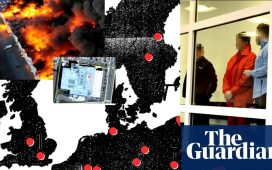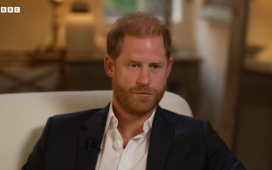Labour’s position on national security has been endorsed by a former head of the UK intelligence agency, GCHQ, who said the party could be trusted to “stick to serious defence policy”.
The backing by Sir David Omand is a boost in an important area for Keir Starmer, who has sought to promote Labour’s security as a way of emphasising how the party has changed since Jeremy Corbyn’s leadership.
Omand praised the party’s manifesto commitments to spend 2.5% of GDP on defence as soon as possible and continue supporting Ukraine against Russia.
“Labour’s announcement of a ‘triple lock’ on our nuclear deterrent indicates that we can in future trust the party to stick to serious defence policy,” he wrote in the Daily Telegraph.
Starmer said earlier this month that Labour was the “party of national security”. Shortly afterwards, a YouGov tracker found Labour had surpassed the Conservatives for the first time when it came to public views of which party would be best at handling defence and security.
The party has promised to maintain Britain’s continuous-at-sea nuclear deterrent, deliver the new ballistic submarines being built at Barrow-in-Furness and provide all the upgrades needed to keep the deterrent going.
Omand criticised the government’s move, when David Cameron was prime minister, to delay the order for new submarines, adding that this had ignored “the increasingly intense warnings of his chief of defence and senior civil servants”.
In 2010, the government decided to delay replacing the submarines by up to five years, prolonging the life of the Vanguard-class submarines launched in 1992.
“The inevitable result was a long and very costly refit for the oldest of the current fleet, HMS Vanguard, which had to include an unplanned refuelling of her nuclear reactor,” Omand said.
“This has meant unnecessary expenditure of hundreds of millions of pounds, as well as great strain on our submariners and their families. This was completely avoidable.”
after newsletter promotion
Rishi Sunak has previously argued that Labour is a threat to national security, saying shortly before he called the election that Starmer’s actions demonstrated he would not be able to keep the country safe.
On Monday, he sought to push back on Labour’s encroachment into what has long been traditional Conservative policy territory, telling reporters the Labour leader did not have “the courage of his convictions”.
“It’s obvious that the world is incredibly dangerous, and for someone who wants to be prime minister of our country not to prioritise investing more on our country’s security, I find deeply concerning,” the Conservative leader told reporters.
The Tories have also pledged to raise defence spending to 2.5% of GDP, saying they will hit this target by 2030, while Labour has not put a timeframe on its promise.











